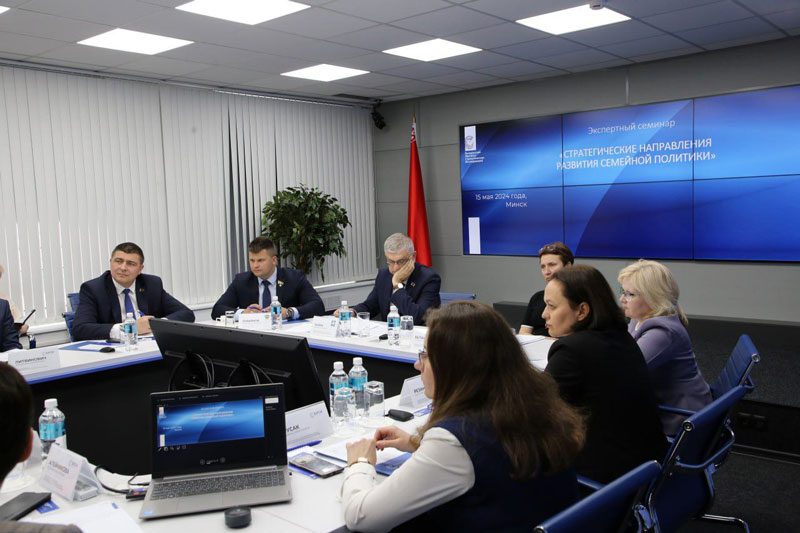Family policy in Belarus should be more coordinated, and socio-psychological support should prevail over economic support. This conclusion was reached by representatives of science, ministries and public organizations, deputy corps who took part in an expert seminar at the Belarusian Institute of Strategic Research. The meeting discussed trends, problems of the family institution and promising directions of its development.

"Family policy is multifaceted," Vitaly Punchenko, BISR Deputy Director, said. "It includes education, health care, education of the young generation, creation of a microclimate in the family, and work. And it is important to set priorities in strategic directions correctly."
The meeting announced outcomes of the republican sociological survey "Strategic directions in assessments and representations of citizens". Following the survey, one of the main reasons that prevents our families from having more than one child is the lack of proper housing conditions – 47.8% of respondents. 34.8% of respondents see the desire to live for themselves, 28.1% – the lack of desire to have more children, 23.6% – the state of health of one of the spouses. The inability to pay enough attention to children is considered the reason why they do not make a decision to have a second child, – 22.6% of respondents, – and 20.6% explain this by the fact that there is no one to help care for children. Less common causes include problems at work, a shortage of kindergartens, limited career growth for women and difficulties with medical care.
Experts have stated that the value of children in the family is decreasing. One of the trends influencing this is mass urbanization and individualization. They "come from Europe" and destroy the model of a patriarchal family that is familiar to us, when several generations lived together under one roof and, as a rule, the family had many children. Representatives of the modern generation no longer need heirs as a guarantee that someone will take care of them in old age. Today, it is possible independently and with the help of the state provide a certain level of comfort on a well-deserved rest. The Internet also influences the fact that motherhood and fatherhood are becoming less valuable for young people.
"Today, young parents spend less than an hour a day in direct contact with their child," Alexander Lukyanov, the Belarusian Youth Union leader, says. "A quick snack – and busy with phones and other gadgets. The influence of social networks is a separation from family ties, from attachment to one's own territory. Such a type of employment as freelancing is being popularized, which does not give people the opportunity to live a sedentary lifestyle, creates uncertainty in the environment, the place where they will be, as well as in their partner. Only 10-15 percent of our young people know the military history of their relatives and close ones."

According to deputy Eduard Severin, family values are treated differently in the regions. Having many children is more respected, for example, in Polesie, where people get married earlier than, for example, in Minsk and other large cities. This is largely due to the religiosity of the Polesie residents.
Supporting the rural way of life with its traditions of having many children should also be taken into account when implementing economic support measures, the deputy believes:
"There are many examples when villagers with many children are given housing in cities, they eventually begin to lead an antisocial lifestyle. The family is destroyed, dependency arises. There are those who say – take the apartment and return us to the village. People deprived of their usual way of life and a source of income on earth do not always adapt to a new place."
Svetlana Belash, Head of the Population, Gender and Family Policy Department of the Ministry of Labor and Social Protection, notes:
"Today, the state shows how important the family is, and there is a whole range of support at the republic level. But since the regions are developing in different ways, additional measures need to be created locally. Unfortunately, that does not happen."
Elena Simakova, Deputy Head of the Department of Social, Educational and Ideological Work of the Main Department of Educational Work and Youth Policy of the Ministry of Education, speaks about the need for a coordinated policy of departments in strengthening the institution of the family.
"Doctors are currently engaged in the health of teenage girls," the specialist gave an example. " On the other hand, we know the position of the Belarusian Orthodox Church in relation to sex education. What do the doctors say? Including how to avoid unwanted pregnancy. This is how we help the girl maintain her health, but at the same time we slow down the birth rate. The way out is when doctors, representatives of the church and public organizations and teachers find this balance of interests."
The experts came to the conclusion that socio-psychological and spiritual and moral support for motherhood should become one of the strategic directions for the family policy development. It is necessary to study and implement the best practices of encouraging childbirth in countries with high demographic indicators, to develop infrastructure and services in the field of recreation, development and education of children. Local authorities should intensifytheir support for the family, and at the national level, ensure interdepartmental cooperation.


